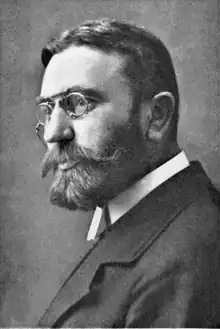Gustav Lindau
Gustav Lindau (2 May 1866 in Dessau – 10 October 1923 in Berlin), was a German mycologist and botanist.
Biography
Gustav Lindau studied natural history in Heidelberg and Berlin, where he studied under Simon Schwendener (1829–1919). He completed his doctoral thesis on the apothecia of lichens in 1888. In 1890, he became director at the botanical garden in Münster and an assistant to Julius Oscar Brefeld (1839–1925).

In 1892, he became an assistant at the Berlin botanical garden. He obtained his habilitation in 1894, and became a professor in 1902.[1] He has been credited for having introduced the term "plechtenchyma" to refer to fungal tissue in an 1899 publication, which he proposed could be further adapted for specific tissue types by adding prefixes such as "para-" and "proso-".[2]
The genus Lindauea (Acanthaceae) was named in his honor by Rendle, (it is now a synonym of Lepidagathis Willd.[3]), and the fungi genus Lindauella was named after him by Heinrich Rehm in 1900.[4] The fungus genus Lindauomyces, named by Koorders in 1907, is now a synonym of Arthrobotryum Ces.[5]
Works
- Gustav Lindau and Paul Sydow: Thesaurus literaturae mycologicae et lichenologicae. (1908–1917, 5 volumes)
- Gustav Lindau: Kryptogamenflora für Anfanger ("Cryptogam flora for Beginners"). (1911–1914, 6 volumes)
Literature
See also
- Category:Taxa named by Gustav Lindau
References
- Gustav Lindau (1866 - 1923) Illinois Mycological Association
- Mitchell, M.E. (2014). "De Bary's legacy: the emergence of differing perspectives on lichen symbiosis" (PDF). Huntia. 15 (1): 5–22.
- "Lindauea Rendle | Plants of the World Online | Kew Science". Plants of the World Online. Retrieved 24 June 2022.
- BHL Taxonomic literature : a selective guide to botanical publications
- "Lindauomyces Koorders, 1907". www.gbif.org. Retrieved 24 June 2022.
- International Plant Names Index. Lindau.
Note
Based in part on the translation from the German Wikipedia.